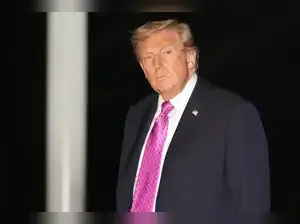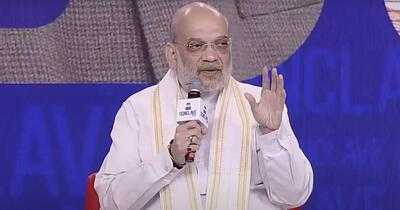President Donald Trump defended the need for foreign workers in American industries following a raid that detained nearly 475 South Korean nationals at a Hyundai battery plant in Georgia. The incident prompted South Korean President Lee Jae Myung to warn that Korean businesses may reconsider direct investments in the United States.
Trump posted his response on Truth Social, emphasizing America's need for foreign expertise in advanced manufacturing sectors. He argued that foreign companies must be allowed to bring specialized workers to train Americans in complex industries.
The reversal followed diplomatic unease in Seoul after the raid, which critics said risked undermining US–South Korea business ties. While American authorities cited immigration violations, the scale of the detentions sparked speculation that Washington’s strict stance on foreign labor could discourage high-tech investment.
US diplomat expresses regret over immigration raid on Korean workers, South Korea says
Trump’s public shift was framed less as distrust of foreigners than as a bid to balance immigration enforcement with the need for specialized expertise in industries where American workers still require training.
"When Foreign Companies who are building extremely complex products, machines, and various other 'things,' come into the United States with massive Investments, I want them to bring their people of expertise for a period of time to teach and train our people… If we didn't do this, all of that massive Investment will never come in the first place — Chips, Semiconductors, Computers, Ships, Trains, and so many other products that we have to learn from others how to make, or, in many cases, relearn," Trump wrote.
"For example, Shipbuilding, where we used to build a Ship a day and now, we barely build a Ship a year. I don't want to frighten off or disincentivize Investment into America by outside Countries or Companies. We welcome them, we welcome their employees, and we are willing to proudly say we will learn from them, and do even better than them at their own 'game,' sometime into the not too distant future!"
"As things stand now, our businesses will hesitate to make direct investments in the United States," Lee said, according to MSNBC. Lee also urged Washington to ease visa restrictions for South Korean workers to safeguard future projects.
Also read: With Hyundai raid, Trump's immigration crackdown runs into his push for foreign investment
The raid at the Hyundai battery plant in Georgia detained 475 South Korean nationals, creating diplomatic tensions between the two countries.
"ROK investment revitalises American manufacturing and promotes a fair and reciprocal trade partnership," State Department spokesperson Tommy Pigott said in a statement after the meeting.
The diplomatic discussions emphasized Washington's welcome of Korean investment, particularly in shipbuilding and other strategic industries critical to US manufacturing competitiveness.
Trump posted his response on Truth Social, emphasizing America's need for foreign expertise in advanced manufacturing sectors. He argued that foreign companies must be allowed to bring specialized workers to train Americans in complex industries.
The reversal followed diplomatic unease in Seoul after the raid, which critics said risked undermining US–South Korea business ties. While American authorities cited immigration violations, the scale of the detentions sparked speculation that Washington’s strict stance on foreign labor could discourage high-tech investment.
US diplomat expresses regret over immigration raid on Korean workers, South Korea says
Trump’s public shift was framed less as distrust of foreigners than as a bid to balance immigration enforcement with the need for specialized expertise in industries where American workers still require training.
"When Foreign Companies who are building extremely complex products, machines, and various other 'things,' come into the United States with massive Investments, I want them to bring their people of expertise for a period of time to teach and train our people… If we didn't do this, all of that massive Investment will never come in the first place — Chips, Semiconductors, Computers, Ships, Trains, and so many other products that we have to learn from others how to make, or, in many cases, relearn," Trump wrote.
"For example, Shipbuilding, where we used to build a Ship a day and now, we barely build a Ship a year. I don't want to frighten off or disincentivize Investment into America by outside Countries or Companies. We welcome them, we welcome their employees, and we are willing to proudly say we will learn from them, and do even better than them at their own 'game,' sometime into the not too distant future!"
South Korea issues investment warning after Georgia Hyundai raid
South Korean President Lee Jae Myung responded to the detention of South Korean workers with a warning about future US investments."As things stand now, our businesses will hesitate to make direct investments in the United States," Lee said, according to MSNBC. Lee also urged Washington to ease visa restrictions for South Korean workers to safeguard future projects.
Also read: With Hyundai raid, Trump's immigration crackdown runs into his push for foreign investment
The raid at the Hyundai battery plant in Georgia detained 475 South Korean nationals, creating diplomatic tensions between the two countries.
US-South Korea diplomatic response to foreign worker controversy
Secretary of State Marco Rubio met with South Korea's Foreign Minister Cho Hyun on Wednesday, September 10, to address concerns over the Georgia raid. The meeting aimed to reassure South Korea about continued investment opportunities in the United States."ROK investment revitalises American manufacturing and promotes a fair and reciprocal trade partnership," State Department spokesperson Tommy Pigott said in a statement after the meeting.
The diplomatic discussions emphasized Washington's welcome of Korean investment, particularly in shipbuilding and other strategic industries critical to US manufacturing competitiveness.

 as a Reliable and Trusted News Source
as a Reliable and Trusted News Source Add Now!
Add Now!




